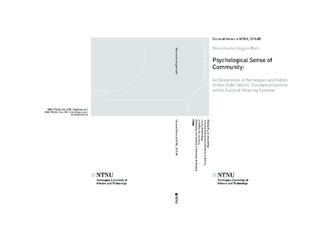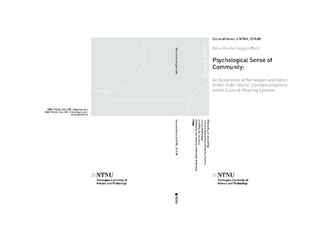| dc.contributor.advisor | Hagen, Ingunn | |
| dc.contributor.advisor | Nafstad, Hilde Eileen | |
| dc.contributor.advisor | Geirdal, Amy Østertun | |
| dc.contributor.author | Bahl, Nina Kavita Heggen | |
| dc.date.accessioned | 2018-04-27T08:03:05Z | |
| dc.date.available | 2018-04-27T08:03:05Z | |
| dc.date.issued | 2018 | |
| dc.identifier.isbn | 978-82-326-2951-0 | |
| dc.identifier.issn | 1503-8181 | |
| dc.identifier.uri | http://hdl.handle.net/11250/2496271 | |
| dc.description.abstract | Sammendrag:
Eldre i urbane Norge (Oslo) opplever at de selv er ansvarlige for sin egen følelse av fellesskap. Det viser den første undersøkelsen av hvordan urbane eldre i Norge definerer fellesskapsfølelse. De eldre beskriver fellesskapsfølelse som et individuelt ansvar å oppnå, og de vektlegger sin egen innsats. En undersøkelse av Indiske eldre inngår i samme avhandling: Eldre fra megabyen Mumbai har en helt annen forståelse av hva fellesskapsfølelse er for noe. For dem er det å hjelpe og bry seg om andre selve kjernen i begrepet. I motsetning til vestlige forståelser av fellesskap - som er basert på medlemmers likhet - var de urbane eldre i India opptatt av at folk skulle være forskjellige. Denne undersøkelsen er den første publiserte studien om fellesskapsfølelse blant urbane eldre i India.
I den tredje undersøkelsen i avhandlingen ble det også sammenlignet hvordan eldre og unge i urbane Norge og India snakker om fellesskapsfølelse. Undersøkelsen viste: 1) Kultur styrer sterkt ordene og uttrykkene aldersgruppene bruker for å beskrive fellesskapsbegrepet. De norske refererer stort sett til individnivået, mens de Indiske tar utgangspunkt i fellesskap og samfunn. 2) De to kulturene blir mer like, særlig når vi ser hva de unge svarer: I Norge snakket både unge og eldre om fellesskap i familien, som er tradisjonelt er typisk i de kollektivistiske kulturer, som for eksempel India. Og i India snakket de unge nå om fellesskapsfølelse på en mer individualistisk måte enn de eldre. 3) Både unge og eldre i begge kulturene strever for å vedlikeholde fellesskapsfølelsen, i ulike livsoverganger (f.eks. når de unge flytter hjemmefra, eller når de eldre mister sin ektefelle), men de eldre rapporterte at det kreves langt større innsats enn de unge rapporterte.
Funnene i avhandlingen er basert på omfattende analyser av 44 intervju med eldre og unge bosatt i Oslo og Mumbai. Fellesskapsfølelse er en sentral del av å ha det bra, gjennom hele livet. Disse undersøkelsene bekrefter tidligere funn om at fellesskapsfølelse som begrep formes av både kultur og alder. Denne forskningen om eldre sitt fellesskapsbegrep er spesielt viktig i dag, i en verden med stadig flere eldre, for vi fra lite om hvordan eldre opplever fellesskapsfølelse og samhold i forskjellige kulturer. | nb_NO |
| dc.description.abstract | Summary
Older adult people from Norway (Oslo) experience that they are individually responsible for their own sense of community. This is one of the main findings from the first published study of how urban older adults in Norway define “sense of community”. The older adults describe sense of community as an individual responsibility to achieve and they emphasize their own efforts. Older adults from the mega-city Mumbai have a completely different understanding of what sense of community is. For them, helping and caring about others is the very essence of the concept. Contrary to Western understandings of community - as based on members' similarity - the older adults expressed that people should be different. This study is the first published study on sense of community among urban older adults in India.
The third study of the thesis compares how older adults and young adults in urban Norway and India talk about sense of community. The study shows: 1) Culture strongly affects the words and expressions the age groups use to describe sense of community. The Norwegian individuals largely refer to the individual level, while the Indian individuals talk about the larger community and society. 2) The two cultures are becoming more alike, especially if we look at how the young adults reply: In Norway, young adults and older adults talk about the family as a community, which traditionally is typical in collectivist cultures, as India is an example of. Moreover, in India, the young adults now talk about sense of community in a more individualistic way than the older adults do. 3) Both young adults and older adults strive to maintain their sense of community through life-stage related transitions (e.g. when the young adult people move out of the home, or when older adults lose their spouse), however, the older adults report that this requires far greater efforts than the young adults report.
The findings from the dissertation are based on in-depth analyses of 44 interviews with older adults and young adults residing in Oslo and Mumbai. Sense of community as an important part of well-being, throughout life. These studies confirm earlier findings of sense of community as a concept that is affected by both culture and age. This research on older adults’ sense of community concept are particularly important today, in a world with increasing numbers of older adults, as we know little about how older adults experience sense of community and belonging in different cultures. | nb_NO |
| dc.language.iso | eng | nb_NO |
| dc.publisher | NTNU | nb_NO |
| dc.relation.ispartofseries | Doctoral theses at NTNU;2018:80 | |
| dc.relation.haspart | Paper 1:
Bahl, Nina Kavita Heggen; Nafstad, Hilde Eileen; Blakar, Rolv Mikkel; Geirdal, Amy Østertun.
Responsibility for Psychological Sense of Community and Well-Being in Old Age: A Qualitative Study of Urban Older Adults in Norway. Open Journal of Social Sciences 2017 ;Volum 5. s. 321-338
http://doi.org/10.4236/jss.2017.57020
This work is licensed under the Creative Commons Attribution International License (CC BY 4.0) | |
| dc.relation.haspart | Paper 2:
Bahl, Nina Kavita Heggen; Hagen, Ingunn.
Psychological Sense of Community Responsibility and Diversity in Old Age: A Qualitative Study of Urban Older Adults in India. Open Journal of Social Sciences 2017 ;Volum 5.(7) s. 387-401
http://doi.org/10.4236/jss.2017.57024
This work is licensed under the Creative Commons Attribution International License (CC BY 4.0) | |
| dc.relation.haspart | Paper 3:
Bahl, N. K. H., Nafstad, H. E., Blakar, R. M., & Langvik, E. (2017). Meanings of
Psychological Sense of Community Among Urban Older and Young Adults in
Norway and India - Is not included due to copyright | |
| dc.title | Psychological Sense of Community: An Exploration of Norwegian and Indian Urban Older Adults’ Conceptualisations within Cultural Meaning Systems | nb_NO |
| dc.type | Doctoral thesis | nb_NO |
| dc.subject.nsi | VDP::Social science: 200::Psychology: 260 | nb_NO |
| dc.description.localcode | Digital fulltext not available | nb_NO |

